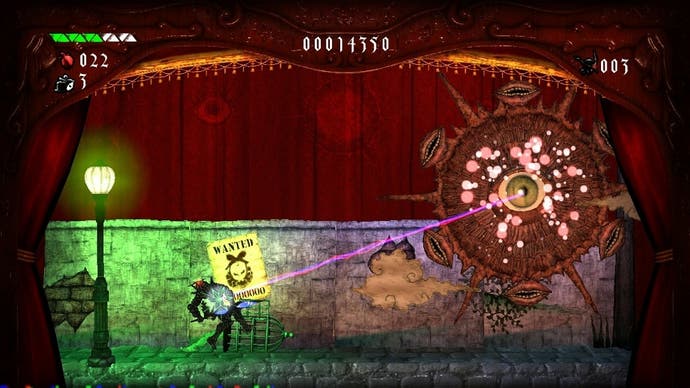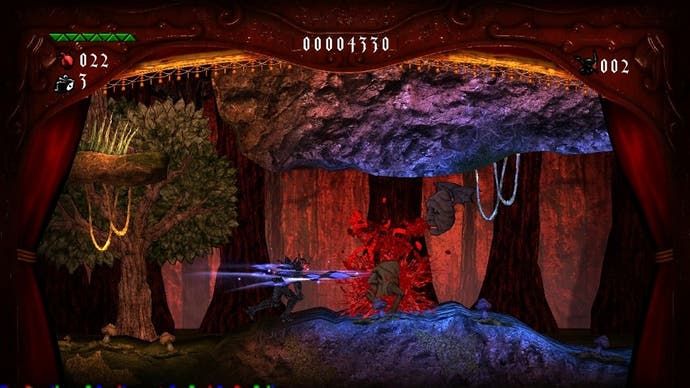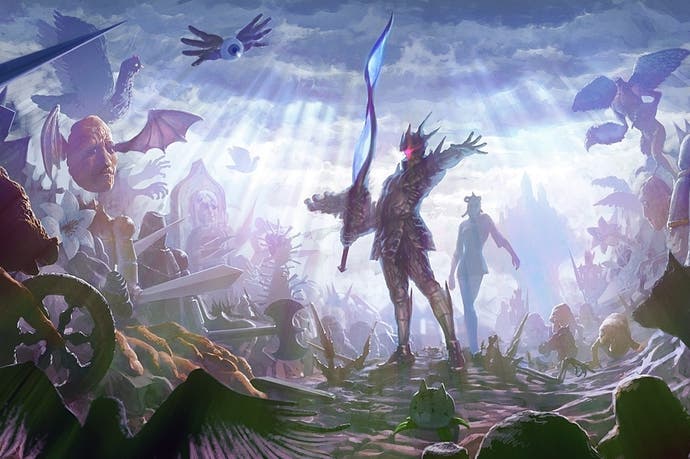Black Knight Sword review
Paper cuts.
In a more honest world, Black Knight Sword would be billed as a piece of interactive Dark Souls fan-fiction created by a Hungarian studio that seems to have hired Terry Gilliam as its head illustrator. For one, this downloadable game shares a name with one of the fearsome weapons found in Hidetaka Miyazaki's dark fantasy classic. Then there's the fact that its protagonist is made in the image of that weapon's wielder, Dark Souls' Black Knight, one of the cruel, martial giants who patrol Lordran wearing treacle-black armour and a horned helmet riveted with red pinprick eyes. Some of his original intimidating heft has been lost in the move to a papercraft world in which Monty Python-esque hellspawn bob about, as comical as they are hideous - but the comparison rings truer than you might expect.
In our world, however, where all intellectual property is delivered by a scrum of midwife lawyers, such links must remain unstated. Black Knight Sword is instead known as the second collaboration between game director Suda51 and Digital Reality - who together created of one of 2012's finest download games, Sine Mora. Black Knight Sword wears its Suda51 influence more clearly than that bright shoot-'em-up. It's filled with offbeat character, scattershot humour and the sort of obsession with death, the afterlife and the grim absurdity that lurks in both that one might expect from an ex-undertaker.
Beneath the extrovert styling - all hopping monsters with cage-heads, forest microwaves that ding-spit health-replenishing skulls, grinning wolves - the game is uncomplicated. You play as the titular Knight, thwacking the hell-monsters with your coiled sword or sending a black Hellebore projectile whipping through the air to damage them while pressing on, left to right, deeper into the game's mysteries. Enemies drop hell-hearts - of the anatomically correct variety, all flapping ventricles and snipped arteries - which are used for currency in the hell-shops that are dotted about the six stages.

Suda51's comically masochistic side is again revealed in these shops, whose keepers are giant unblinking eyeballs surrounded by yapping mouths that upgrade your knight's health, armour or attack power with a lighting bolt zap to the torso. Each stage is bookended by a challenging boss - a pencil-scrawled potato knight whose face is hidden behind his breastplate, or a fireball-spewing angel - and upgrading your character to keep apace of the challenge is of paramount importance. Soon you learn to leave no ectoplasm blob un-murdered in order to harvest the precious hearts. Anything less than an unchecked devotion to carnal capitalism will leave you under-levelled for the hell-challenges that wait.
Style is what separates Black Knight Sword from the slew of Ghost n' Goblins knock-offs, and this is a relentlessly stylish game, even if it greedily refuses to settle upon a single style. The game's wider setting is that of a theatre, with velvet curtains that draw back on 'start' to reveal the action.
The papercraft motif remains throughout the game, new scenery dropping into place as you move left and right with delightful, stage-managed choreography. A malicious narrator's voice revels in your misfortunes, while the audience groans when your character dies and rises to form silhouette shapes during the inter-level breaks. It's a strong idea; the standing ovation must go to the props men, whose backdrops to the action provide the most delight, slotting into place as you run around the stage with clockwork precision. In between stages, the story is fleshed out with grisly watercolour slides, seemingly hand-painted by a child.
The soundtrack is a melange of influences: discordant harpsichords and dusty pianos provide an atmosphere of creeping terror, while a melancholic jazz sax plays the knight off when he dies. Boss battles are announced with a trumpet fanfare while percussive singing in nonsense tongues adds a creepy overtone that chatters you along your journey.

Black Knight is unexpectedly agile and precise in the hands. He double-jumps with quickness and ease, his sword thrusts spiking enemies into heart showers with a light touch. Press down while in mid-air and the knight will use his sword as a pogo stick, bouncing on enemy heads in a spikily vindictive take on Mario's famous bounce.
As the game progresses, steeper demands are made of your reactions and the knight's awkward evasive move starts to prove frustrating, failing to provide adequate precision when rolling out the way of an incoming projectile or under the belly of a monster for a rear attack. Protecting your health bar becomes ever more important, not least because you are given scant few 'lives' to restart following a death. Black Knight Sword has an old-school flavour in that respect, offering checkpoints but demanding players proceed with precaution else risk being thrown back to the start screen.
Light platforming elements make an appearance, with switch-blocks that can be operated by striking them with your Hellebore in order to lower bridges or provide impromptu walkways across chasms of spikes. Incongruous doorways decked out in circus flags offer warp points between rooms, but the level design is functional rather than inspiring. New magical attacks are gifted to the Knight after each stage, while special attacks can be purchased in the store in order to expand the Knight's repertoire, but these additions are inessential.
Black Knight Sword is a stylish anachronism, but an anachronism nonetheless. Its richest ideas are to be found in the presentation, the aesthetic, the art direction and stage direction. Elsewhere, this is a rather rote production, its substance plainly enjoyable, but mostly forgettable.

